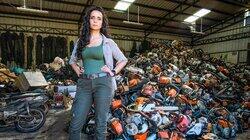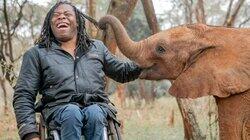Our Changing Planet - Season 1

Season 1

Episodes

Episode 1
The launch of the BBC's ambitious seven-year natural history project, in which six presenters visit six of the planet's most threatened ecosystems to meet the people fighting to restore the Earth's delicate balance.
In this first episode, Steve Backshall, Chris Packham and Ella Al-Shamahi visit the Maldives, Iceland and Cambodia.
Steve Backshall travels to the Maldives, an area facing significant challenges because of climate change. Warming seas and the acidification of the oceans have led to coral bleaching on a massive scale, destroying the surrounding ecosystem. The biodiversity of the reefs provides food security, income and other benefits to the people of the Maldives, and Steve finds that they are working hard to try to stem the tide of destruction. He also goes diving off the reefs to check on a group of manta rays, whose presence offers a clear indication of the health of the reef.
In Iceland, Chris Packham learns more about the effects of global warming. Temperatures in the Arctic are rising at more than twice the annual global average. Snow and ice are melting at an increasing rate, which contributes to rising sea levels and is likely to provoke extreme temperature events beyond the Arctic. As one of the eight Arctic States, Iceland is being dramatically affected by rising temperatures, with the lives and livelihoods of many islanders being threatened. Chris also discovers that melting sea ice is opening the Arctic to navigation. These seas are home to many species of whales, so Chris joins a team of young scientists monitoring the impact of increased commercial shipping on humpback whales.
On the other side of the world, Ella Al-Shamahi visits Cambodia in Southeast Asia, an area experiencing increasing economic growth. However, growth is putting massive pressure on natural resources, with ever-expanding cities and devastating overexploitation of the natural world. The Mekong river is the lifeblood of this region, but whole sections of it are under pressure. Ella meets a fishing community living on the Tonle Sap lake. The lake used to offer rich fishing grounds for local communities, but the construction of many dams along the wider Mekong is now threatening to destroy the biodiversity of this once abundant lake.
The building of new roads has given poachers easier access to forests, and the illegal wildlife trade is big international business. Ella visits a project in Cambodia that rescues and rehabilitates illegally trafficked wildlife, including pangolins, the most trafficked mammal on Earth.

Episode 2
In this second programme, another three presenters visit people fighting to rebalance vulnerable habitats around the world.
Liz Bonnin travels to California to learn about the increasingly invasive wildfires hitting the headlines. Scientists can see clear links between the fires, climate change, raised temperatures and an extended drought season. There is one crucial element that is key to a sustainable future in California: biodiversity. Loss of keystone species and large carnivores is a threat to the state's ecosystems, and conservationists and scientists are mobilising to save wildlife from wildfires and to treat their burns.
Liz also visits the Pacific coast of California, where warming seas have brought with them a new resident, great white sharks. With each shark consuming up to 18 kilos of prey at a time, the impact they could have on the marine ecosystem is being studied intently.
Ade Adepitan travels to Kenya to look at the effects rising temperatures are having on the land. Hundreds of millions of Africans depend on rainfall to grow their food and keep livestock, and the capacity for adaptation is low. Ade also visits a project in Kenya that is going to extraordinary lengths to safeguard the future of its most charismatic creature, the African elephant.
Over in Brazil, Gordon Buchanan discovers a pioneering project that is trying to save one of the Amazon's iconic predators, the jaguar. Brazil is the most biodiverse country in the world, and as well as the Amazon rainforest, it is home to one of the world's most important wetlands, the Pantanal. This area is home to high numbers of jaguars, but in 2020, wildfires destroyed 30 per cent of the Pantanal, killing an estimated 17 million animals. More than a quarter of the resident jaguars were directly impacted by these fires, through habitat loss, food shortages, injury and death.
Recently Updated Shows

Moonshiners
The secret and illegal world of moonshining stretches all across Appalachia raking in a pretty penny for those who choose to shine. Moonshiners will go to unprecedented extremes in their efforts to hide their still sites and cloak their distribution networks, some can hide in plain sight. With new styles of shine being tested and sold there is a king's ransom waiting for those bold enough to grab it. But those who enforce the law are wise to shiner deceptions and more determined than ever to catch them red handed and in the act of making Moonshine. The day of reckoning may be around the corner, but don't sell the Moonshiners short. Each has a keen understanding of how to stay one step ahead of the law in their region, and in this ongoing cat and mouse game you never know who will end up in the trap.

The Au Pair
The Au Pair follows a woman who seems to have it all—a successful husband, adorable stepchildren, a thriving business and a gorgeous home. When her diabetic father moves in next door and she begins to experience marital issues, however, she reluctantly agrees to hire an au pair. A beguiling young French woman takes the job and causes an unsettling shift in the household.
As instincts and suspicions arise, hidden agendas are hinted at and long-concealed truths are unveiled.

Allegiance
Allegiance follows on identity and belonging, policing and politics, and finding truth within the heart of a flawed justice system. Sabrina Sohal is a star rookie police officer who must grapple with the limits of the justice system as she fights to exonerate her politician father Ajeet Sohal. Sohal serves her diverse hometown of Surrey alongside Vince Brambilla, a veteran training officer who sees her potential but doesn't always agree with her forward-thinking methods. Allegiance is the story of a young woman caught between her allegiance to her flag, to her badge, and to her family.

Britain's Got Talent
Britain's Got Talent brings together the very best variety acts from across the nation as they compete to win a life changing £250,000 and a coveted spot on The Royal Variety Performance.

Crime Nation
Redefining the true crime genre, each thrilling two-hour episode delves deep into a riveting true crime sensation that has captured the attention of the nation. Each episode reveals new details about these stories through expert analysis, exclusive reporting and never-before-seen interviews. Also dives into the world of social media by talking to crime enthusiasts, social media sleuths, podcasters and digital detectives who in some instances have used their network to help solve cases.